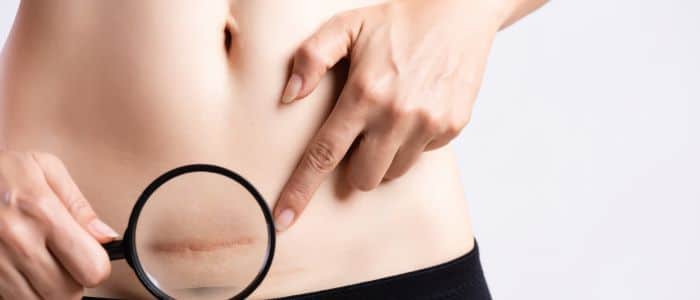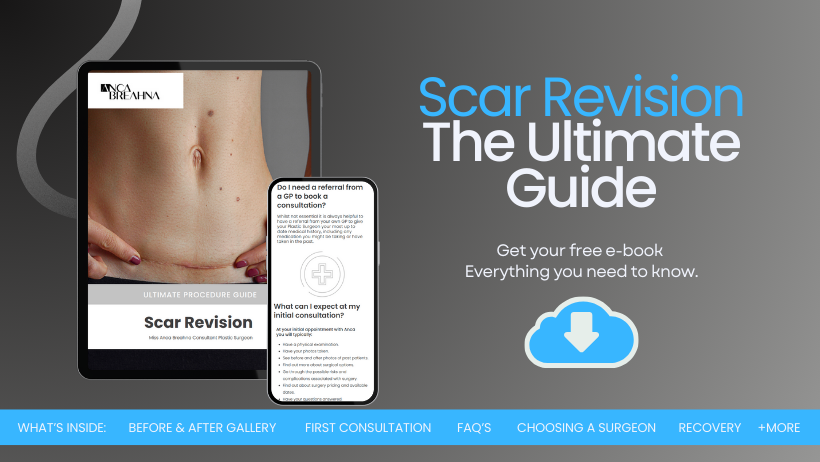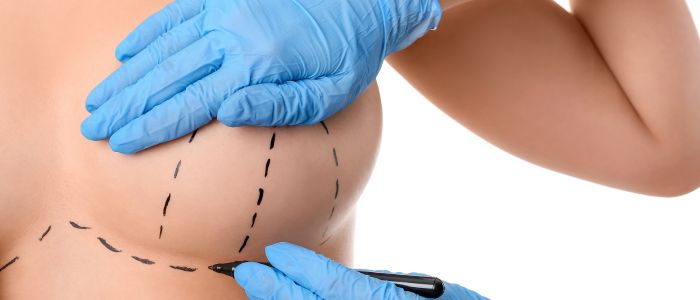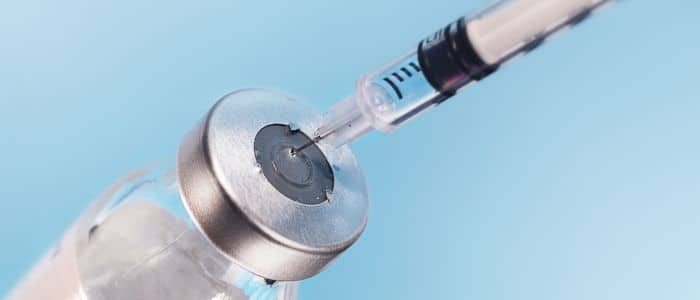
Scar Treatment Options after Plastic Surgery
Plastic surgery, whether for cosmetic or reconstructive purposes, often leaves behind a silent yet persistent reminder: scars. The process of undergoing plastic surgery is personal and varied, with a range of motivations from aesthetic enhancement to the restoration of function or form following trauma or illness. However, the presence of plastic surgery scars can be a source of concern for many. They are not just physical marks but can also carry emotional weight, affecting how individuals perceive their bodies and, by extension, themselves. Therefore,
Treating, Reducing, and Minimising Plastic Surgery Scars
In this blog, Consultant Plastic Surgeon Anca Breahna will discuss the complex process of treating, reducing, and minimising scars following plastic surgery.
Download Miss Anca Breahna’s Scar Revision Guide

Types of Scars following Plastic Surgery
When you go through plastic surgery, it’s pretty normal to end up with some sort of scar. It’s just part of the body’s way of healing. But not all scars are the same. They can look very different depending on a few things, like what kind of surgery you had and what your skin is like.
There are a few common types of scars you might see after surgery:
- Keloid Scars: These are the kind that grow bigger than the original wound. They’re raised, dark, and can sometimes be a bit uncomfortable. They’re more common in people with darker skin
- Hypertrophic Scars: Similar to keloid scars, these are also raised and red, but they don’t grow beyond the wound area. They can fade a bit over time
- Atrophic Scars: These are the opposite of raised scars. They’re sunken and can look a bit pitted, like with acne scars
Depending on the surgery, you might get a fine line scar, which is just a thin, flat line. Or, for more major surgeries, the scar might be thicker and more noticeable.
Factors Influencing Scar Formation
So, why do some people get bigger or more noticeable scars than others? Well, a few things play a role:
- Surgical Technique: How the plastic surgeon cuts and stitches you up can affect how your scar looks. Some techniques are better for reducing scar appearance
- Incision Location and Size: Where on your body you’re cut and how big the cut is can influence scar formation. Some parts of the body, like the chest or back, are more prone to tougher scars
- Your Skin Type: Your skin’s characteristics, like its colour and texture, can make a difference. For example, darker skin is more likely to develop keloid scars
- Your Age: Generally, older skin doesn’t heal as quickly or as neatly as younger skin
- Genetics: Sometimes, how you scar is just down to your genes. If your family members tend to get certain types of scars, there’s a chance you might too
Knowing these things can help you get a clear picture of what to expect after your surgery. It’s important to remember that scars are a normal part of healing and everyone’s body reacts a bit differently. If you’re worried about scarring, it’s a good idea to talk to your plastic surgeon before the procedure. Anca can give you an idea of what to expect and what can be done to reduce scarring after your surgery.
Initial Scar Care and Management
After you’ve had plastic surgery, how you look after the incision area is super important. This is the first step in making sure you heal properly and reduce the chances of getting noticeable scars. Here’s what you need to focus on:
- Keep the Area Clean: This is key to prevent infections. Anca will probably tell you how to clean the incision site and what to use. It’s usually about gently cleaning with mild soap and water or a special solution
- Avoid Stress on the Surgical Site: You’ve got to be careful not to put too much strain on the area where you had surgery. This means avoiding certain movements or activities that might pull or stretch the skin there. For example, if you had surgery on your abdomen, you might need to avoid bending or lifting heavy stuff for a while
- Follow Surgeon’s Instructions: Your plastic surgeon knows best when it comes to your recovery. Anca will tell you how to take care of the wound, like how often to change the bandages and how to do it safely
- Rest and Recovery: It’s not just about the wound care; you also need to give your body the rest it needs to heal. This might mean taking some time off work or avoiding certain activities for a while
- Watch for Signs of Complications: Keep an eye out for any red flags like increased pain, redness, swelling, or discharge from the incision site. These could be signs of infection or other issues that need quick attention
Why It’s Important to Follow Anca’s Guidelines
Sticking to what your plastic surgeon tells you about wound care can really make a difference in how you heal and how your scar looks later on. Here’s why these instructions are so important:
- Preventing Infection: Following Anca’s advice helps keep the wound clean and reduces the risk of infection, which can make scars worse
- Optimal Healing: Anca will give you these instructions based on what she knows works best for healing. When you follow them, you’re giving your body the best chance to heal neatly
- Medication Management: If you’ve been given medications, like antibiotics or painkillers, taking them exactly as prescribed helps with healing and managing discomfort
- Spotting Problems Early: By knowing what’s normal and what’s not during your recovery, you can spot any issues early and get them sorted out before they become bigger problems
In short, the care you take in the first days and weeks after your surgery plays a huge part in your overall recovery. It’s not just about the immediate healing; it’s also about how your scars will look down the track. So, take it easy, follow your plastic surgeon’s advice, and give your body the attention it needs to heal well.
Professional Scar Treatment Options
Here are some options for treating plastic surgery scars:
Laser Therapy
Laser therapy is a popular choice for reducing the look of scars after plastic surgery. It’s a bit like giving your skin a fresh start. Here’s how it works:
- How Laser Therapy Works: The laser targets the top layer of your skin, the part where the scar is. It gently removes this layer, encouraging new, healthy skin to grow in its place. This can make the scar less noticeable
- Types of Lasers: There are different lasers for different types of scars and skin tones. Some lasers are better for lighter skin, while others are designed for darker skin. Anca will choose the best one for your specific scar and skin type
- What to Expect: During the treatment, you might feel a bit of discomfort, like a snapping sensation against your skin. Most people handle it pretty well. You might need a few sessions to get the best results, depending on your scar
- Aftercare: Your skin might be red and a bit swollen after the treatment, but this usually settles down pretty quickly. You’ll need to follow Anca’s advice on looking after your skin afterwards, like staying out of the sun and using specific skincare products
Steroid Injections
If you’ve got raised scars, like keloids or hypertrophic scars, steroid injections can be a good option. They’re especially useful for scars that are thick and stick out.
- How They Work: The steroid is injected directly into the scar. It helps to flatten and soften the scar, making it less raised and less noticeable
- Treatment Plan: You usually need a series of injections, not just one. These are spaced out over several weeks or months. Anca will tell you how many you’ll need based on your scar
- Effectiveness: Many people see a big difference in their scars after these injections. The scars can become a lot less noticeable
- Side Effects: There can be some side effects, like discomfort at the injection site or changes in the skin colour around the scar. These are usually temporary
Surgical Revision
In some cases, the best way to deal with a scar is to go back to surgery. This is called surgical revision. It’s often considered for larger or very noticeable scars.
- What It Involves: Anca removes the old scar tissue and closes the incision again. She uses special techniques to try and make sure the new scar heals better than the old one
- When It’s Used: It’s usually an option when other treatments haven’t worked or if the scar is really affecting how you feel about your appearance
- Recovery: Just like with your original surgery, you’ll need some time to heal after a surgical revision. You’ll also have a new scar, but the aim is for it to look better than the old one
Each of these options has its own pros and cons, and what works best can depend on your specific scar and how your skin heals. It’s important to talk these options through with Anca. She can help you figure out the best plan for your scars, so you can feel better about your skin.
At-Home Care and Remedies for Plastic Surgery Scars
Silicone Sheets and Gels
One of the simplest and most effective ways to look after your scars at home is using silicone sheets and gels. Here’s a bit about how they work:
- Hydrating the Scar: Silicone helps keep the scar nice and moist. This can stop it from getting too hard and raised
- Reducing Size and Colour: Over time, these silicone products can make the scar flatter and lighter in colour
- Ease of Use: They’re pretty straightforward to use. Once your scar has healed enough (your plastic surgeon will tell you when it’s okay), you just apply the silicone sheet or gel directly onto the scar
- Duration of Use: You might need to use them for a few months to get the best results. It’s all about being consistent
Massage and Moisturisation
Giving your scar a bit of attention with massage and moisturisation can also help. Here’s why:
- Softening the Scar: Regular massage and keeping the scar moisturised can make it softer and less noticeable
- Breaking Down Scar Tissue: Gentle massage helps break down the scar tissue. It can also improve blood flow to the area, which is good for healing
- How to Do It: Use a gentle, circular motion to massage the scar. You can use a moisturiser or oil to help your fingers glide over the skin. Just make sure the product you’re using is okay for scars
Natural Remedies and Their Effectiveness
You might also hear about natural remedies like aloe vera and vitamin E oil. Here is what you should know about them:
- Soothing and Moisturising: These natural products can be really soothing and help keep the scar moisturised
- Effectiveness: While they’re great for moisturising, there’s a bit of debate about how much they actually reduce scars. They might help a bit, but probably not as much as treatments like silicone sheets
- Safe to Try: One good thing is that they’re usually pretty safe to try. Just make sure you’re not allergic to them, and that they don’t irritate your scar
At-home care for scars is all about being consistent and gentle. Whether you’re using silicone products, massaging, or trying natural remedies, the key is to keep at it. These methods might not make your scar disappear completely, but they can definitely help make it less noticeable and more comfortable. And remember, if you’re not sure about something or if your scar is causing you a lot of worries, it’s always a good idea to have a chat with Anca or a skin specialist. They can give you more advice and help you find the best way to look after your scar.
FAQs on Treating, Reducing, and Minimising Plastic Surgery Scars
Can diet or supplements help in scar healing post-plastic surgery?
- Yes, your diet can play a role in how well you heal after surgery. Eating foods rich in vitamins, such as Vitamin C and E, can support skin health. Supplements like zinc can also aid in healing, but it’s best to discuss this with Anca before starting any new supplement.
Is it possible to completely remove a scar from plastic surgery?
- It’s often not possible to completely remove a scar, but various treatments can significantly reduce their appearance. The goal is to make the scar less noticeable and more comfortable.
How long does it take for a scar to mature and reach its final appearance?
- Scars usually take about a year to fully mature and show their final appearance. During this time, the scar will change in colour and texture. Early treatment can help ensure a better final appearance.
Are there any specific exercises or physical activities that are beneficial for scar healing?
- Gentle exercises, particularly those that promote blood flow without putting strain on the scar area, can be beneficial. Activities like walking or light stretching can be helpful, but it’s important to follow your surgeon’s advice on when to resume physical activities.
When is it safe to start applying makeup over a plastic surgery scar?
- Generally, you should wait until the wound has completely healed and the sutures are removed before applying makeup. This is usually a few weeks after surgery, but it’s essential to get the green light from your plastic surgeon first to avoid any risk of infection or irritation.
Further Reading about Plastic Surgery with Consultant Plastic Surgeon Anca Breahna
- Read more about Causes and Solutions for FUPA (Fat Fat Upper Pubic Area)
- Read more about Benefits of Motiva Breast Implants
- Read more about 10 Things to Consider Before a Breast Reduction
- Read more about Split Tummy Muscles – Causes and Solutions
- Read more about Private Surgery vs NHS
- Read more about How to Get Rid of Old Scars
Medical References about Minimising Scars after Plastic Surgery
- Cosmetic Procedures: Scars – WebMD
- Scar Treatment 101: What are the first steps? – American Society of Plastic Surgeons
- Update on Postsurgical Scar Management – PubMed
- Management of Scarring Following Aesthetic Surgery – NCBI
- Scar Revision – Cleveland Clinic



 Ms Anca Breahna, PhD, MSc, FEBOPRAS, FRCS (Plast) is a highly regarded Consultant Plastic Surgeon specialising in the field of Aesthetic and Reconstructive Plastic Surgery. Anca performs a range of
Ms Anca Breahna, PhD, MSc, FEBOPRAS, FRCS (Plast) is a highly regarded Consultant Plastic Surgeon specialising in the field of Aesthetic and Reconstructive Plastic Surgery. Anca performs a range of 